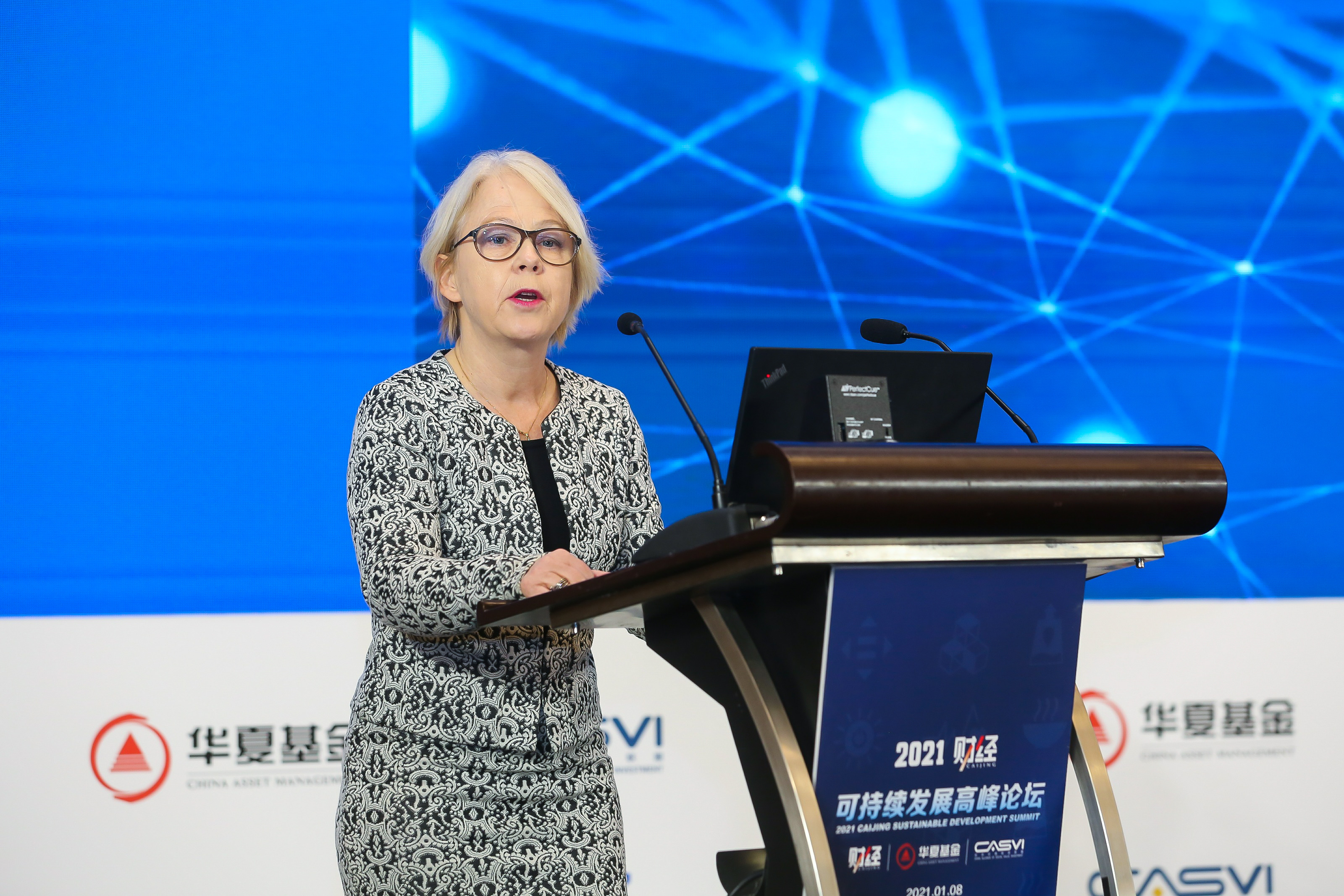Remarks by Ms. Beate Trankmann, UNDP Resident Representative in China
2021 Caijing Sustainable Development Forum
Sustainable Value Creation in an Unprecedented Era of Transition
January 8, 2021
尊敬的戴小京总裁 (dài xiǎo jīng zǒng cái)
Distinguished guests, ladies, and gentlemen: Good morning!
On behalf of the United Nations Development Programme in China, it is my pleasure to join the 2021 CaiJing Sustainability Summit.
Last year was meant to be the beginning of a Decade of Action on the Sustainable Development Goals, which aim to end poverty and protect our planet. But those efforts were disrupted by COVID-19 and the global economic crisis it brought. How we chose to recover and build back will determine our resilience to even greater crises, like climate change. So, shifting to a greener path has never been more critical. Warning lights, for our societies and our planet, are flashing red.
Even before the pandemic, we were not on track to reach any of the SDGs by their 2030 deadline. Now, COVID-19 is erasing years of development progress. The pandemic could push more than 150 million people back into extreme poverty by the end of 2021. Global growth is projected to have fallen by 4.4 percent last year.
Today, COVID-19 is squeezing our world in ways that force governments, development partners and businesses to rethink where finance comes from, and how to invest better for our future.
Before the pandemic, the annual financing gap to achieve the SDGs was estimated at US$ 5 -7 trillion. Since then, COVID-19 has devastated SDG financing in developing countries. They face an additional shortfall of USD 1.7 trillion to put the SDGs back on track.[1] Without fundamental change, this shortage is likely to worsen.
Investing in the SDGs and “leaving no one behind” goes beyond an ethical imperative; it is a risk mitigation strategy and a business opportunity. It’s estimated that by 2030, SDG-generated growth could reach US$12 trillion. China alone could account for almost 20 percent of this. So, financing the SDGs isn’t only the right thing to do; it’s the smart thing to do – supporting jobs, growth and the planet, all at once.
Sustainable finance or sustainable business are not new ideas in China. For instance, 义利并举 (yì lì bìng jǔ)[2] was used by Yongjia School (永嘉学派 yǒng jiā xué pài) in the Southern Song Dynasty.[3]
In recent years, China has become a pioneer in greening its economy and financial system. In 2020, finance authorities updated the China Green Industry Catalogue – excluding coal and natural gas, while adding hydrogen, sustainable agriculture, green consumer finance, green services and manufacturing. President Xi Jinping reaffirmed China’s commitment to the SDGs and increased the ambition on combatting climate change by aiming “to have CO2 emissions peak before 2030 and achieve carbon neutrality by 2060.”
The next frontier in funding sustainable development must put people and planet at the heart of the financial system. Companies must adjust business models – and investors should demand information on their sustainability performance.
UNDP supports sustainable finance. Globally, as one of five institutional stakeholders of the UN Financing for Development Agenda, we work with countries to develop a common SDG-aligned financing framework that puts forward concrete actions for different actors.[4]
We enable countries to mobilise private funding for the SDGs and combat climate change by helping governments and market players design financial sector strategies that regulate and incentivize capital flows towards green projects. In Indonesia and Mexico, for example, we helped develop frameworks, eligibility criteria and reporting systems for green and SDG-aligned bonds.
To this end, UNDP focuses on three areas:
Firstly, we work on SDG Impact Standards for Private Equity, SDG Bonds and Enterprises. This aims to provide investors and businesses with a common framework to measure, manage and communicate their SDG contributions in a consistent, transparent way. A group of more than 20 Private Equity Funds is soon putting these Standards into practice, with a similar process being followed for Bonds.
Secondly, UNDP is developing SDG Investor Maps, offering new data and evidence to help funds, financiers and corporations identify investment opportunities that support the SDGs. It translates country-specific SDG needs and policy priorities into concrete investment opportunities. These Maps are being developed in 12 countries including China, and will be expanded to another 25.
Thirdly, UNDP China launched the SDG Finance Taxonomy - China last year. This is the first classification system with impact assessment and reporting criteria, allowing public and private investors and developers to identify SDG-enabling projects. The New Development Bank’s upcoming issuance of an SDG-linked RMB bond already applies the Taxonomy and SDG Impact Standards for SDG Bonds – a global first for a multilateral development bank.
Yet businesses cannot achieve sustainable financing alone. Challenges remain in moving to greener finance, largely because current financial markets and tools were created with financial return as the primary motivation. Markets, investors and regulators must redefine what ‘return’ means; as not only financial, but also social and environmental. Unless financial models also assess how investments affect our society and planet, we threaten the stability of our economies, as COVID-19 has shown. A sustainable recovery must be backed by laws and incentives that channel financing where it is needed most, into resilient and scalable development solutions.
This is why we, at UNDP, are committed to building platforms that bring together all stakeholders and support long-term packages for a green, resilient recovery. And we are keen to partner with you all on this journey.
If governments and investors make decisions that strengthen the SDGs; and if issuers demand standardized, transparent SDG reporting; then a sustainable future can be financed, and achieved. Thank you!
[1] OECD (2020), Global Outlook on Financing for Sustainable Development 2021: A New Way to Invest for People and Planet, OECD Publishing, Paris
[2] EN translation: "pursuing both benefits and righteousness"
[4] UN Secretary General’s Strategy for Financing the 2030 Agenda for Sustainable Development

 Locations
Locations




